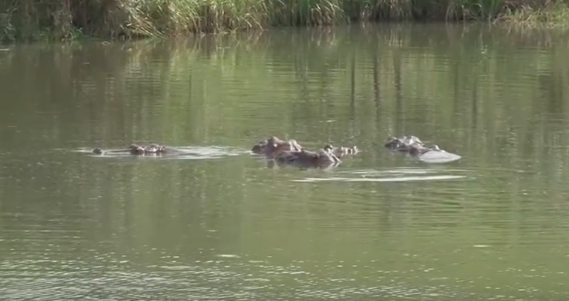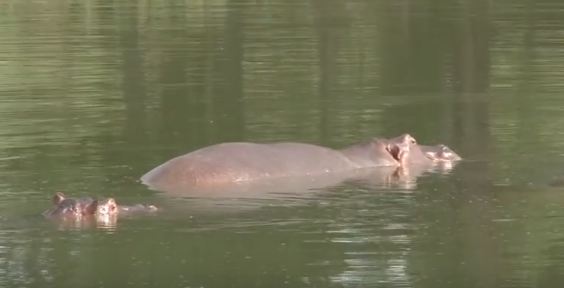Pablo Escobar's hippos
Jul. 25th, 2018 07:07 pmWe didn't make it to Medellín on this trip to Colombia, but in reading through our guidebook, we discovered that some distance outside of Medellín, drug lord Pablo Escobar had his private ranch, Hacienda Napoles, where he had, among other things, a menagerie of exotic animals, including hippos. After Pablo Escobar's downfall, the other animals were taken to zoos, but the hippos had managed to elude capture... and established themselves in Colombia's Magdalena River (and other watery locations), which they apparently LOVE.


(images from this National Geographic video about the hippos)
There were originally four hippos--and now there are more than 40. Unlike in Africa, there are no predators in Colombia, and there's also no hot, dry season, so the hippos are having babies every year instead of every two years, and they're coming to maturity sooner.
I thought this was a kind of amusing invasive-species story because usually invasive species are ... smaller? Zebra mussels or Japanese beetles or starlings or rabbits. But hippos are the third-largest land mammal (after elephants and rhinoceroses); adults weigh more than a ton. Hippos are not quite a godzilla-level invasive species, but they do represent a challenge for the ecosystem; Colombian zoologists worry about the impact on the local manatee population.
Lucy Cooke, a zoologist and filmmaker, has a great nine-minute video (and you can get a transcript if you don't like watching videos) describing the situation, here. Hippos may look kind of dopey-cute, but they're apparently pretty aggressive. It's made worse by the fact that male hippos have harems (the original four hippos were one male and three females), and they kick out newly mature male hippos to go find mates elsewhere--but of course, there are no other females elsewhere for these poor newly grown hippos. So they're lonely and sexually frustrated.

(image source)
Lucy Cooke said killing the hippos was unpopular among Colombians, so they they decided to try castrating the male hippos. But this is apparently very, very, very hard to do--it's hard to sedate a hippo because of their fat; you don't want the sedative to take effect when they're in the water or they'll drown, and--hippo testicles move about in their bodies when they're under stress, so you've got your sedated hippo, and now you have to find his testicles. .... Okay, they don't move around that much--they don't troop from the groin region up to the shoulders or anything like that--but apparently they can move like eight centimeters or so. One castration cost around $100,000, so that's probably not a solution either. She thinks they'll establish themselves and become a new subspecies eventually. Maybe the manatees and hippos will work something out...
Sources:
Marta Rodriguez Martinez, "Colombia Declares War on Pablo Escobar's Hippos," Euronews, February 2, 2018.
Lucy Cook, "Pablo Escobar's Hippos Are Now Colombia's Problem," Big Think, July 10, 2018.
Wikipedia, hippo entry.


(images from this National Geographic video about the hippos)
There were originally four hippos--and now there are more than 40. Unlike in Africa, there are no predators in Colombia, and there's also no hot, dry season, so the hippos are having babies every year instead of every two years, and they're coming to maturity sooner.
I thought this was a kind of amusing invasive-species story because usually invasive species are ... smaller? Zebra mussels or Japanese beetles or starlings or rabbits. But hippos are the third-largest land mammal (after elephants and rhinoceroses); adults weigh more than a ton. Hippos are not quite a godzilla-level invasive species, but they do represent a challenge for the ecosystem; Colombian zoologists worry about the impact on the local manatee population.
Lucy Cooke, a zoologist and filmmaker, has a great nine-minute video (and you can get a transcript if you don't like watching videos) describing the situation, here. Hippos may look kind of dopey-cute, but they're apparently pretty aggressive. It's made worse by the fact that male hippos have harems (the original four hippos were one male and three females), and they kick out newly mature male hippos to go find mates elsewhere--but of course, there are no other females elsewhere for these poor newly grown hippos. So they're lonely and sexually frustrated.

(image source)
Lucy Cooke said killing the hippos was unpopular among Colombians, so they they decided to try castrating the male hippos. But this is apparently very, very, very hard to do--it's hard to sedate a hippo because of their fat; you don't want the sedative to take effect when they're in the water or they'll drown, and--hippo testicles move about in their bodies when they're under stress, so you've got your sedated hippo, and now you have to find his testicles. .... Okay, they don't move around that much--they don't troop from the groin region up to the shoulders or anything like that--but apparently they can move like eight centimeters or so. One castration cost around $100,000, so that's probably not a solution either. She thinks they'll establish themselves and become a new subspecies eventually. Maybe the manatees and hippos will work something out...
Sources:
Marta Rodriguez Martinez, "Colombia Declares War on Pablo Escobar's Hippos," Euronews, February 2, 2018.
Lucy Cook, "Pablo Escobar's Hippos Are Now Colombia's Problem," Big Think, July 10, 2018.
Wikipedia, hippo entry.
no subject
Date: 2018-07-26 01:13 am (UTC)no subject
Date: 2018-07-26 01:25 am (UTC)no subject
Date: 2018-07-26 01:20 am (UTC)no subject
Date: 2018-07-26 01:26 am (UTC)no subject
Date: 2018-07-26 06:16 am (UTC)Also, you are never too old to learn new things. HIPPOS HAVE MIGRATORY TESTICLES.
no subject
Date: 2018-07-26 11:19 am (UTC)no subject
Date: 2018-07-26 02:10 am (UTC)I like this theory best.
no subject
Date: 2018-07-26 02:35 am (UTC)books
Date: 2018-07-26 02:32 am (UTC)River of Teeth: https://publishing.tor.com/riverofteeth-sarahgailey/9780765395221/
The House of the Scorpion by Nancy Farmer
Both very worth reading.
Re: books
Date: 2018-07-26 02:34 am (UTC)Re: books
Date: 2018-07-26 02:49 am (UTC)Re: books
Date: 2018-07-26 03:09 am (UTC)Re: books
Date: 2018-07-26 06:15 am (UTC)Re: books
Date: 2018-07-26 11:21 am (UTC)no subject
Date: 2018-07-26 09:00 am (UTC)no subject
Date: 2018-07-26 11:23 am (UTC)no subject
Date: 2018-07-26 11:42 am (UTC)no subject
Date: 2018-07-26 06:11 pm (UTC)no subject
Date: 2018-07-26 01:48 pm (UTC)Hippos are dangerous creatures! If a hippo is on shore, do not walk between it and the water. Really! Even if you are as slender as a heron or as tall as a garter snake, do not walk between a hippo and the water. If you do, it will freak out and trample you! Sounds bizarre, I know!
no subject
Date: 2018-07-26 02:05 pm (UTC)no subject
Date: 2018-07-26 01:51 pm (UTC)no subject
Date: 2018-07-26 02:02 pm (UTC)no subject
Date: 2018-07-26 04:43 pm (UTC)no subject
Date: 2018-07-26 06:01 pm (UTC)no subject
Date: 2018-07-26 05:54 pm (UTC)no subject
Date: 2018-07-26 06:01 pm (UTC)no subject
Date: 2018-07-27 03:31 am (UTC)no subject
Date: 2018-07-27 12:00 pm (UTC)And, although I know now about hippos' reputation, I honestly didn't before coming across this story. Since I was ignorant, it's easy for me to imagine other people being ignorant.
Yeah, I worry about the manatees too. I'd like to know more about the two species' pattern of interaction--though they haven't been interacting for all that long. If they don't compete directly for food, and if the places they give birth in are different, then maybe they can share the same space? But if hippos are aggressive about other big guys coming into their space, then maybe things won't work out. And if Colombian zoologists are worried, I guess there's good reason to worry.